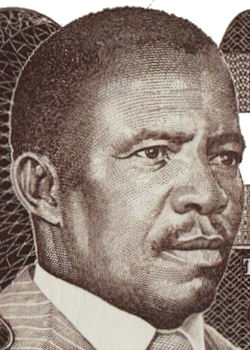Ketumile Masire

Unlike his predecessor Sir Seretse Khama, who came from the influential Bangwato tribe, Masire came from a minority tribe, the Bangwaketse of Kanye. And that was not the only set back with which he had to contend. Kanye, where he was born and raised, was also the stronghold of the opposition Botswana National Front (BNF) led by Dr Kenneth Koma. They had founded the Botswana Democratic Party (BDP) in 1962 and went on to form the government together after independence in 1966. But this was not necessarily an advantage. From the onset, he fought to establish tribal balance in a government that was previously dominated by the Bangwato. Changes he made in his cabinet were evidence of his desire to create tribal harmony.
Masire played a crucial role in facilitating and protecting Botswana’s steady financial growth and development. As President, Sir Ketumile Masire was responsible for the introduction of comprehensive social service programmes which significantly improved Botswana’s education, communications and health indicators. Sir Ketumile Masire’s government was able to increase nutrition levels in the country during the 1980s, despite Botswana experiencing a severe drought. During his tenure of office, he was Chairman of the Southern African Development Community (SADC) and Co-Chairperson of the Global Coalition for Africa. He also became the first Vice-Chairman of the Organization of African Unity in 1991.
During his period in office, Sir Masire was a vocal opponent of apartheid in South Africa and has been involved more recently in diplomatic initiatives in a number of African countries including Rwanda, the Democratic Republic of Congo, Ethiopia and Lesotho. He has played a crucial role in Botswana’s economic and social development, shifting the country away from its economic dependence on South Africa and helping to create domestic industries and make Botswana a place of choice for foreign investors.
Since his retirement in 1998 Sir Ketumile Masire has been involved in numerous diplomatic initiatives in a number of African countries, including Ethiopia, Lesotho, Malawi, Mozambique, Ghana and Swaziland. Between 1998 and 2000 he served as Chairman of the International Panel of Eminent Personalities Investigating the Circumstances Surrounding the 1994 Rwanda Genocide, and between 2000 – 2003 was the facilitator for the Inter-Congolese National Dialogue, which had the objective of bringing about a new political dispensation for the Democratic Republic of Congo, in terms of the Lusaka Ceasefire Accord.
In 2015 he said: “Corruption imposes heavy costs on the economy and distorts development policies. It hurts the poor disproportionately by diverting funds intended for development. It undermines government’s ability to provide essential services. It fuels inequality and injustice and discourages foreign investment”.
|
NEWSLETTER
|
| Join the GlobalSecurity.org mailing list |
|
|
|

